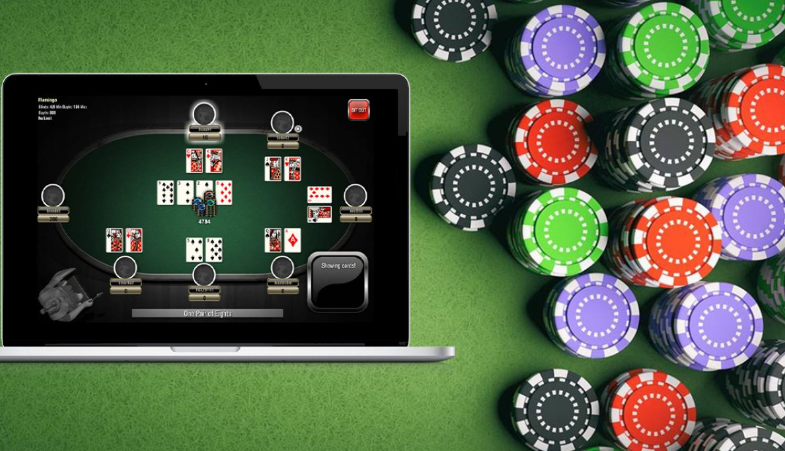A Beginner’s Guide to Playing Poker Online

The Thrill of Online Poker 🃏✨
Poker, a game of skill, strategy, and a bit of luck, has long captured the hearts of card enthusiasts worldwide. With the advent of the internet, poker transitioned from smoky backrooms to the virtual realm, allowing anyone with an internet connection to play from the comfort of their home. If you’ve ever been curious about the world of online poker but felt intimidated by the intricacies of the game, you’re not alone. This guide is designed to help you navigate the exciting world of online judi slot, step by step, so you can start playing with confidence and, most importantly, have fun!
Whether you’re aiming to play for fun or you’re dreaming of one day going head-to-head with the pros, understanding the basics is crucial. Let’s dive into the essentials that every beginner needs to know before hitting the virtual tables.
1. Understanding the Basics: What is Poker? 🤔💡
Before you start playing, it’s important to understand what poker is. At its core, poker is a card game that combines skill, strategy, and luck. The objective is to win chips or money by forming the best possible hand, or by convincing your opponents that you have the best hand through strategic betting.
Popular Variants of Poker 🎴
There are several variants of poker, but the most common ones you’ll encounter online are:
- Texas Hold’em: The most popular variant, where each player is dealt two private cards, and five community cards are dealt face-up on the “board.” The goal is to make the best five-card hand.
- Omaha: Similar to Texas Hold’em, but each player receives four private cards, and they must use exactly two of them, combined with three of the five community cards, to make a hand.
- Seven Card Stud: Players are dealt seven cards, three face-down and four face-up. The goal is to make the best five-card hand from those seven cards.
Choosing which variant to play can depend on your preferences, but for beginners, Texas Hold’em is a great starting point due to its straightforward rules and widespread availability.
2. Getting Started: Choosing the Right Online Poker Site 🌐🔍
The online poker landscape is vast, and choosing the right platform is crucial. Here are some factors to consider:
Security and Reputation 🔐
You’ll want to play on a platform that is secure and has a good reputation. Look for sites that are licensed and regulated by recognized authorities. Reading reviews and checking forums can give you insight into other players’ experiences.
User Interface and Experience 🎮
As a beginner, you’ll appreciate a site with a user-friendly interface. The layout should be easy to navigate, and the software should run smoothly on your device, whether it’s a computer, tablet, or smartphone.
Bonuses and Promotions 🎁
Many online poker sites offer bonuses to attract new players. These can include welcome bonuses, free tournament entries, or deposit matches. While these offers can be enticing, make sure to read the terms and conditions, so you know exactly what you’re getting into.
Game Variety 🎲
A good poker site should offer a variety of games and stakes, allowing you to start small and gradually work your way up as you gain experience. Look for sites that offer low-stakes games and beginner-friendly tables.
3. Setting Up Your Account: The First Steps 📝💳
Once you’ve chosen a poker site, the next step is to set up your account. Here’s a quick guide to get you started:
Registration 🖱️
Most sites will ask for basic information like your name, email address, and date of birth. Make sure to use accurate details, as you’ll need to verify your account later.
Making a Deposit 💵
To play for real money, you’ll need to deposit funds into your account. Most poker sites accept various payment methods, including credit/debit cards, e-wallets like PayPal, and even cryptocurrencies. Start with a small deposit while you get the hang of things.
Verifying Your Identity 🛂
To comply with regulations, many sites will ask you to verify your identity. This usually involves providing a copy of your ID and proof of address. It’s a standard procedure designed to protect players.
4. Mastering the Basic Rules and Hand Rankings 📚🃏
Understanding the rules and hand rankings is essential for any poker player. Here’s a quick rundown:
Hand Rankings 👑
Poker hands are ranked based on the combination of cards you hold. Here’s the hierarchy from highest to lowest:
- Royal Flush: A, K, Q, J, 10 of the same suit.
- Straight Flush: Five consecutive cards of the same suit.
- Four of a Kind: Four cards of the same rank.
- Full House: Three of a kind plus a pair.
- Flush: Five cards of the same suit, not in sequence.
- Straight: Five consecutive cards of different suits.
- Three of a Kind: Three cards of the same rank.
- Two Pair: Two pairs of cards.
- One Pair: One pair of cards.
- High Card: The highest card in your hand if no other combination is made.
Betting Rounds and Structure 💰
In poker, the game is divided into rounds, with betting happening at each stage. For Texas Hold’em, the rounds are:
- Pre-flop: After players are dealt their two private cards.
- Flop: After the first three community cards are dealt.
- Turn: After the fourth community card is dealt.
- River: After the fifth and final community card is dealt.
Understanding the flow of these rounds is key to making strategic decisions.
5. Basic Strategies: Play Smart, Win Big 🧠💼
While poker involves an element of luck, it’s ultimately a game of skill. Here are some basic strategies to help you get started:
Starting Hands: Know What to Play 👌
One of the most important decisions in poker is choosing which hands to play. As a beginner, it’s wise to stick to strong starting hands like high pairs (Aces, Kings, Queens) or strong combinations like Ace-King.
Position Matters: Play Accordingly 🌍
Your position at the table (where you are in relation to the dealer) greatly affects your strategy. Players who act later in the round have more information about their opponents’ actions, allowing them to make more informed decisions.
Bluffing: Use it Sparingly 🤥
Bluffing is an essential part of poker, but as a beginner, it’s easy to overdo it. Bluff only when you’re confident that it can succeed, and avoid bluffing against multiple opponents.
Bankroll Management: Don’t Risk It All 💸
Managing your bankroll is crucial for long-term success. Set limits on how much you’re willing to spend, and don’t chase losses. It’s better to play within your means and build your bankroll gradually.
6. Common Mistakes to Avoid 🚫⚠️
As you embark on your online poker journey, being aware of common mistakes can save you from unnecessary losses:
Playing Too Many Hands 🃏
It’s tempting to get involved in every hand, but in poker, patience is a virtue. Stick to playing strong hands and fold the rest.
Ignoring Position 📍
Many beginners overlook the importance of position, leading to poor decision-making. Always consider your position when deciding whether to bet, call, or fold.
Over-Betting 💰
Betting too much, especially when you don’t have a strong hand, can quickly deplete your bankroll. Stick to a consistent betting strategy and avoid going all-in without good reason.
Tilt: Keep Your Emotions in Check 😡
“Tilt” refers to letting emotions dictate your play, often leading to poor decisions. If you feel frustrated or angry, take a break and return to the game with a clear mind.
7. Practicing and Improving: The Path to Success 🏆💪
Like any skill, improving at poker requires practice. Here’s how to hone your skills:
Start with Free Games 🆓
Many poker sites offer free games or play-money tables where you can practice without risking real money. Use these to get comfortable with the game mechanics and develop your strategy.
Study the Pros 📚
Watching professional poker players can provide valuable insights into advanced strategies and decision-making processes. Many poker pros stream their games or post videos online—take advantage of these resources.
Join Poker Communities 🌐
There are numerous online forums and communities where players share tips, strategies, and experiences. Engaging with these communities can accelerate your learning curve and provide a support network as you improve.
Analyze Your Play 🔍
Reviewing your hands and analyzing your decisions can help identify areas for improvement. Many online poker sites offer tools to review your past games—use these to refine your strategy.
Conclusion: Your Journey Starts Now 🚀👑
Poker is a game that blends strategy, psychology, and a touch of luck, offering endless excitement and challenges. As you begin your online judi poker journey, remember that patience, practice, and continuous learning are your best allies. By starting with the basics and gradually building your skills, you’ll be well on your way to enjoying the game and maybe even winning big!
So, what are you waiting for? Shuffle up, deal, and dive into the thrilling world of online poker. Good luck, and may the cards be ever in your favor! 🍀🎉





